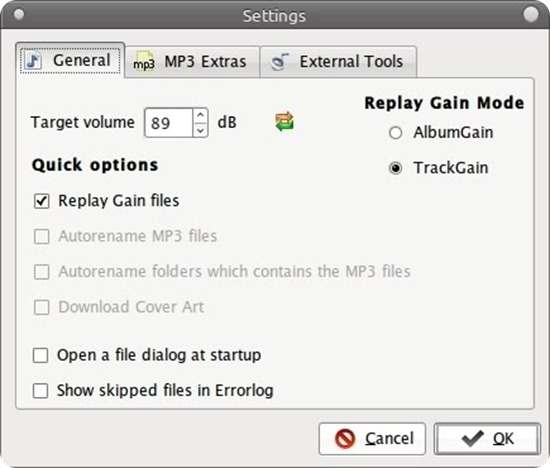
89dB seems to be pretty much "written in stone". If you need to tag MP3 files in Linux, it might be more useful to use foobar2000 with Wine. If I was using a higher target volume though, I'd probably consider enabling the "don't clip" option as no doubt there'd be a lot more MP3s which would need to have their volume reduced a little more to prevent clipping, which of course would mean they're not all being adjusted to the same target volume any more (93dB or whatever you're using), which might defeat the purpose a little.įor the record, I'm not aware of any other programs which let you adjust the target ReplayGain volume as MP3Gain does. One potential snag with mp3gain is that it writes ReplayGain values into APE tags, and these aren't read by many of the audio players on offer in Linux, which prefer ID3v1 or ID3v2 tags instead. instead, it does some statistical analysis (using the replaygain algorithm) to determine how loud the file actually sounds to the human ear. mp3gain does not just do peak normalization, as many normalizers do.

I don't use that option as with a target volume of 89dB it's only the occasional MP3 which has levels above 0dB (which might cause clipping) so I just leave them at 89dB. Mp3gain analyzes and adjusts mp3 files so that they have the same volume. If I remember correctly there's an option called "don't clip when applying track gain" or something similar, and with it enabled MP3Gain will adjust the level to achieve the desired volume and if need be it'll reduce it some more to prevent clipping (do you see lots of red "Y"s after running an analysis?) Part of my reason for doing so is it leaves enough headoom for most MP3s not to cause "clipping" after ReplayGain has been applied. MP3Gain analyzes and adjusts mp3 files so that they have the same volume.
#LINUX MP3 GAIN WINDOWS#
Among others, it works on GNU/Linux, MacOSX, the BSDs, Solaris, AIX, HPUX, SGI Irix, OS/2 and Cygwin or plain MS Windows (not all more exotic. Popular Linux Distros Ubuntu 20.04 LTS (Focal Fossa) 73,250 Packages Ubuntu 22.04 LTS (Jammy Jellyfish) 69,543 Packages CentOS 8 / RHEL 8 15,935 Packages Ubuntu 18.04 LTS (Bionic Beaver) 77,372 Packages Ubuntu 16.04 LTS (Xenial Xerus) 61,875 Packages Ubuntu 21.04 (Hirsute Hippo) 36,998 Packages Ubuntu 21.10 (Impish Indri) 64,636 Packages Ubuntu 20.10 (Groovy Gorilla) 33,295 Packages Arch Linux 12,179 Packages Debian 11 (Bullseye) 58,819 Packages openSuSE Tumbleweed 48,211 Packages openSUSE Leap 40,198 Packages CentOS 7 / RHEL 7 650 Packages CentOS Stream 8 17,085 Packages Fedora 36 68,099 Packages Manjaro 12,617 Packages Fedora 35 67,585 Packages Debian 10 (Buster) 58,305 Packages Kali Linux 63,077 Packages Fedora 34 68,542 Packages Oracle Linux 8 19,969 Packages Amazon Linux 2 8,700 Packages Ubuntu 22.10 (Kinetic Kudu) 67,133 Packages Arch User Repository (AUR) 86,048 Packages Linux Mint 20.I use the default of 89dB. The mpg123 distribution contains a real time MPEG 1.0/2.0/2.5 audio player/decoder for layers 1,2 and 3 (most commonly MPEG 1.0 layer 3 aka MP3), as well as re-usable decoding and output libraries. MP3Gain can also add replaygain compatible (APE) or ID3v2 gain tags toĭescription-md5: c0665aac0cebc4b5a0aa9c9010cd73e9 no support for a special tag is required. Mp3 file directly, without decoding and re-encoding. MP3Gain can adjust the volume in a completely lossless way by modifying the It does some statistical analysis (using the replaygain algorithm) toĭetermine how loud the file actually sounds to the human ear.

MP3Gain does not just do peak normalization, as many normalizers do.

MP3Gain analyzes and adjusts mp3 files so that they have the same volume.


 0 kommentar(er)
0 kommentar(er)
